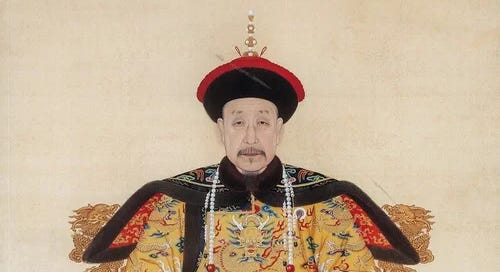In the 18th century the Qianlong emperor of China ordered the completion of a monumental official history of China from the 4th millennium BC to the 17th century. Called the Twenty-four Histories, the collection of more than 3,000 volumes conveyed the authorized version of how the Chinese state came to be and how it developed over time.
The Chinese grand history had been long in the works, and the idea spread to neighboring countries. Japan produced its Six National Histories. Korea came up with the Historical Record of the Three Kingdoms.
In each case the purpose was the same: to justify the present by appeal to the past. Chinese emperors based their authority on the “mandate of heaven," a cosmic permission to rule that remained in force as long as the emperor governed wisely and justly. The Twenty-four Histories essayed to show how the mandate had passed from one dynasty to the next, culminating in the Qing dynasty.
The Chinese official history was unique in its length and comprehensiveness. The Japanese and Korean versions were shorter and less coherent, not least because the histories of those countries were shorter and less coherent than the history of China. Nothing approaching what China produced appeared outside East Asia.
This was not to say that there were no authorized histories. But countries of the West found it less necessary or possible to trace a line of legitimacy so far into the past. Egypt had a long history, but it fell under Greek, Roman and Ottoman rule. The Holy Roman Empire fancied itself a continuation of the Roman empire, but its conceit didn't stick even within its borders.
For this reason, but also because their governments were less determined to control the thoughts of their people, Western rulers left the writing of history to others.
The United States has no official history. To be sure, the American government has dabbled in the historical craft. The US Army compiled an official history of its role in World War II. This was sufficiently well received that the army produced histories of other American wars.
The US State Department, beginning during the Civil War, has published a series titled Foreign Relations of the United States. At the heart of FRUS are government documents relating to American diplomacy and national security. But the annotation and commentary contextualize the documents in what amounts to a narrative of American foreign policy.
Many other federal agencies have gotten into the history business, yielding episodic accounts of their work on behalf of the American public.
The closest thing America has to a written official history appears in textbooks approved by school boards for use in public schools. The books aren’t written by government officials or by people working directly under government contract. But the school boards — typically consisting of elected members — establish the guidelines for what is expected and permissible in history textbooks.
The school boards are state and local entities. There is no national school board. As a result, textbooks in different states can vary in coverage and interpretation. Large states with many students have greater influence with textbook publishers than small states with few students.
Occasionally efforts have been made to nationalize textbook coverage and approach. During the 1950s publishers took care to treat communism in a uniformly negative light. In 2019 the New York Times produced the 1619 Project, an interpretation of American history centered on race and slavery, and promoted it as the basis for school history curricula. In response, the administration of Donald Trump announced the 1776 Project, emphasizing more traditional interpretations.
Following Trump's second election, in 2024, the spirit of the 1776 Project was manifested in orders to purge historical references and treatments categorized as “woke" or “DEI" from museums, parks and historical sites operated by the federal government. In many cases federal facilities that had been renamed to reflect 1619 Project sensibilities got their old names back.
Donald Trump doesn't have many compliments for China. Its government trades unfairly, manipulates currencies, steals intellectual property and spies on Americans, he says. Chinese leaders are bad people and untrustworthy.
It's unlikely Trump knows much about Chinese historiography. And it's unclear what his reaction would be on learning that his efforts on behalf of government-approved history mirror those of China's emperor three centuries ago.
Trump might deny any resemblance. Or he might say old Qianlong had the right idea.




It's time for HWB's multi-volume history of the U.S. a la Will Durant...
The trump administration is trying to have it both ways
They cannot by law. Go back to the confederate, soldiers, names
So they find similar names from military history. So they can use the same names again. And their base thinks that they did what was wanted and returned it to the original name
It's all performative theater